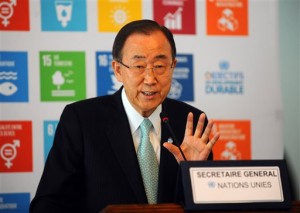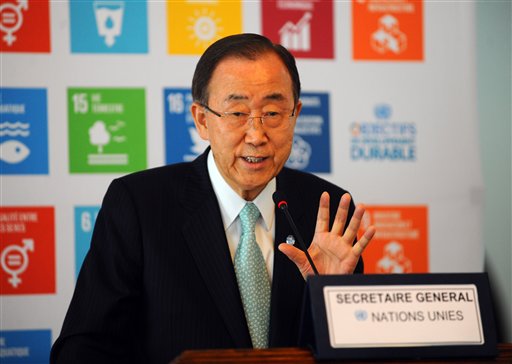ABC News
By Edith M. Lederer, Associated Press

Secretary-General Ban Ki-moon warned Tuesday that Morocco’s expulsion of most of the U.N. peacekeeping mission’s civilian staff in the disputed Western Sahara will likely be exploited by “terrorist and radical elements” and could lead to full-scale war.
In a rebuke to Morocco’s unilateral action, the U.N. chief urged the Security Council to “restore and support” the mission’s role of monitoring a cease-fire between the Moroccan government and the Polisario Front independence movement and helping organize a referendum on the future of the Western Sahara.
He recommended in a report to the council obtained by The Associated Press that the council extend the mission’s mandate until April 30, 2017, with the addition of 14 medical staff. The Security Council which is expected to vote on April 28 on whether to renew the mandate, has called for the mission to continue but is divided on the way ahead.
Morocco annexed Western Sahara in 1975 and considers it as its “southern provinces.” The Moroccan government has proposed wide-ranging autonomy for the region, but the Polisario Front insists on self-determination through a referendum for the local population — as called for in U.N. resolutions.
Polisario Front Secretary-General Mohammad Abdulaziz warned in a letter to the secretary-general last Thursday that Morocco will have “a green light to a military aggression” unless the Security Council imposes “real and direct pressure” on the government to restore the U.N. mission’s work. He warned that the Sahrawi people in Western Sahara will defend their rights in the face of aggression “by all legitimate means, including armed struggle.”
Morocco expelled most U.N. civilian staff last month after the secretary-general used the word “occupation” to refer to the situation in the region following a visit to a camp for Western Sahara refugees in Algeria. The U.N. mission had nearly 500 military and civilian personnel but 83 were ordered to leave and a military liaison was ordered to close, crippling its operation.
In the report, Ban expressed “regret” that the Moroccan government chose not to seek clarification of his comments through diplomatic channels. He reiterated his remarks were not meant “to take sides, express hostility to the Kingdom of Morocco, or signal any change in the approach of the United Nations to the Western Sahara issue.”
Ban said the expulsion of most U.N. international civilian staff has resulted in altering the mandate of the mission, known as MINURSO, “a development that can be expected to be exploited by terrorist and radical elements.”
With limited civilian staff, he said military activities including monitoring the cease-fire “will not be sustainable in the medium to long-term, as the military and civilian components of the mission go hand-in-hand.”
The expulsion of civilian staff also has significant implications for regional stability, Security Council credibility and U.N. peacekeeping operations and political missions globally, Ban said.
He urged the Security Council “to restore and support” MINURSO’s full role, not only to uphold peacekeeping standards and U.N. impartiality, but “most importantly, avoid setting a precedent for United Nations peacekeeping operations around the world.”
“The risk of a rupture of the cease-fire and a resumption of hostilities, with its attendant danger of escalation into full-scale war, will grow significantly in the event that MINURSO is forced to depart or finds itself unable to execute the mandate that the Security Council has set,” Ban said.
Britain’s U.N. Ambassador Matthew Rycroft expressed hope that the council will support Ban’s recommendations.
“It’s absolutely crucial not just for Western Sahara but also for U.N. peacekeeping broadly, particularly across the continent of Africa, that it’s the Security Council that decides the mandate, it’s the Security Council that decides whether to change it or not, and I think that I and the majority of my colleagues will definitely want to keep it as it is,” Rycroft said.







